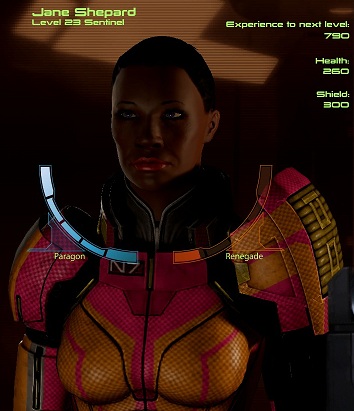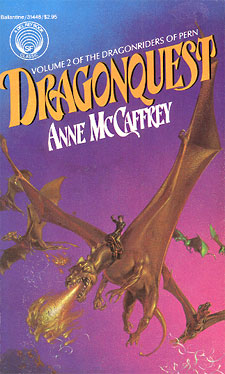I’ve been feeling a bit meh the last couple of weeks, both physically and mentally, for all sorts of not very interesting reasons, so I’ve been fleeing into computer games for a while. Specifically, Mass Effect and Mass Effect 2. Yes, two years after everybody else. I’m not done with the latter, as I don’t want to end it quite yet.
To be honest, as a game it’s not that impressive: an action-rpg with first person shooter sequences, mild puzzles interspersed with lots of cut scenes, the mandatory resource strangled research tree to get your team all the goodies, plus a lot of talking to people. The story meanwhile, at least in it’s broad outline, isn’t that special either: you are the only one standing between Galactic Civilisation and the existential threat of the Reapers and in the second game you have to assemble a crack squad of humans and aliens to deal with their latest scheme.
Part of what does make the Mass Effect games special I’ve already talked about a while back: the heroine, Shepard herself (you can also play with the male version of her, but only dullards do so) and her relationships with her crew and allies. BioWare created a great character, but ultimately it’s your own choices in playing the games that make Shepard who she really is. That’s where the depth of the games, especially the second game — which you can start with the full history of what you did in the previous one– lies in. And it all starts with the character creation.

In my case Shepard is a Black, lesbian woman who has a thing for pink and yellow armour, who tries to do the right thing in every situation, has a thing for aliens, always tries to persuade rather than force people to help her, but who does sometimes have a temper on her. She’s respected, feared and admired, as well as a bad dancer. The games give you just enough information and guidance for you to make up what your Shepard is really like; the rest is up to you.
But what really impressed me in Mass Effect 2 was the way in which several of the missions and asssignments you can play bring home the effects of the war you are fighting. In one mission you have to find a murderer one of your potential teammates has been pursuing for centuries, where you interview the mother of her latest victim; in another you learn that one particular Asari saleswoman is so hostile because she lost her partner in an earlier war and now distrust all aliens. There’s also the background on Jack who did not have a happy childhood to say the least. Apart from that, there are also more mundane assignments, like reconciling two lovers, or getting somebody’s precious memento of their dead husband back.
The usual games I play tend to be either first person shooters with little plot other than shoot everything that moves, or fairly abstract strategy games of one sort or another, with no story other than the gameplay. The Mass Effect games are the first story driven games I’ve played in a long time, apart from Saints Row the Third (which is much more cartoonish) and the first games to have immersed me as deeply as a good science fiction novel can.

